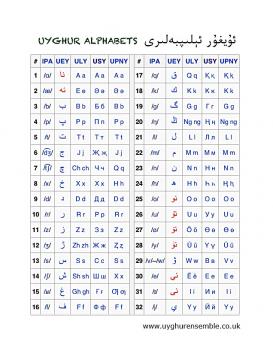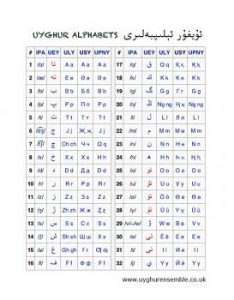International Uyghur Language Day 2017: Linguistic rights a cornerstone in protecting Uyghur identity

Uyghur Human Rights Project, 16 June 2017

UHRP — On the occasion of International Uyghur Language Day, June 15th 2017, the Uyghur Human Rights Project (UHRP) invites all concerned individuals, human rights groups and governments to speak out against Chinese government policies aimed at undermining the linguistic rights of the Uyghur people. UHRP also encourages the international community to protect linguistic diversity as a critical aspect of building resilient ethnic minorities in an age cultural assimilation.
“International Uyghur Language Day is an opportunity to celebrate the vibrancy and richness of the Uyghur language. Uyghur scientists, philosophers and poets have made remarkable contributions to humanity in their own language. Uyghurs are rightfully proud of these achievements and wish to secure a future for their children as speakers of Uyghur,” said UHRP Director Omer Kanat in a statement.
Mr. Kanat added: “As an international community, we have a responsibility to promote diversity across the globe. China has implemented a series of policies that undermine the Uyghur language with the goal of establishing Chinese as the Uyghurs’ first language. Despite guarantees in international and domestic law, the Chinese authorities have unilaterally prioritized communication in government, commerce and education among Uyghurs toward Mandarin Chinese.
In 2007 UHRP detailed how the Chinese government was implementing an education policy that effectively marginalized the Uyghur language from the education system. Despite the fact that right to develop and use minority languages is protected by Article Four of the Chinese constitution, in reality centrally formulated policies undermine and marginalize the Uyghur language. The ‘bilingual education’ policy was designed to transition Uyghur students at all levels from education in their mother tongue to education in Chinese.
At the 2014 Work Forum, Chinese officials placed ‘bilingual education’ at the center of efforts to achieve ‘ethnic mingling,’ an initiative aiming to blur the cultural distinctiveness of the Uyghur people and assimilate Uyghurs into the Chinese nation dominated by the Han culture. The Chinese government has stated that by 2020 almost the entire non-Han Chinese student population will be educated in ‘bilingual education’ schools.
In 2015, UHRP published Uyghur Voices on Education: China’s Assimilative ‘Bilingual Education’ Policy in East Turkestan. The report detailed on-going problems with the ‘bilingual education’ policy, including noticeable differences in funding and class size in Uyghur-majority schools and reports of Uyghur teachers who have lost their jobs as a result of unreasonable requirements for Mandarin language qualifications. The shortage of teachers in East Turkestan often means unqualified Han instructors are hired to fill the gap.
The discrimination against Uyghur teachers that UHRP documented in our report on Uyghur labor rights continues. In a March 30, 2017 report Xinhua detailed how “4,387 bilingual kindergartens will be built or expanded in 2017 across the region. And 10,000 bilingual teachers will be hired this year, 6,500 more compared with previous years.” UHRP believes such rapid steps toward Chinese language education at the kindergarten level will accelerate the decline in status of the Uyghur language. UHRP is concerned these measures have not included broad based and genuine consultation of Uyghur parents and communities.
On International Uyghur Language Day, UHRP calls on China to:
Realize Article 26.3 of the Universal Declaration of Human Rights:
Parents have a prior right to choose the kind of education that shall be given to their children.
Ratify the International Convention on Civil and Political Rights and implement the provisions protected in Article 27:
In those States in which ethnic, religious or linguistic minorities exist, persons belonging to such minorities shall not be denied the right, in community with the other members of their group, to enjoy their own culture, to profess and practice their own religion, or to use their own language.
Realize Article 4.4 of the Declaration on the Rights of Persons Belonging to National or Ethnic, Religious and Linguistic Minorities:
States should, where appropriate, take measures in the field of education, in order to encourage knowledge of the history, traditions, language and culture of the minorities existing within their territory.
Meet obligations set out in Article 29.1(c) of the Convention on the Rights of the Child:
States Parties agree that the education of the child shall be directed to: The development of respect for the child’s parents, his or her own cultural identity, language and values.

